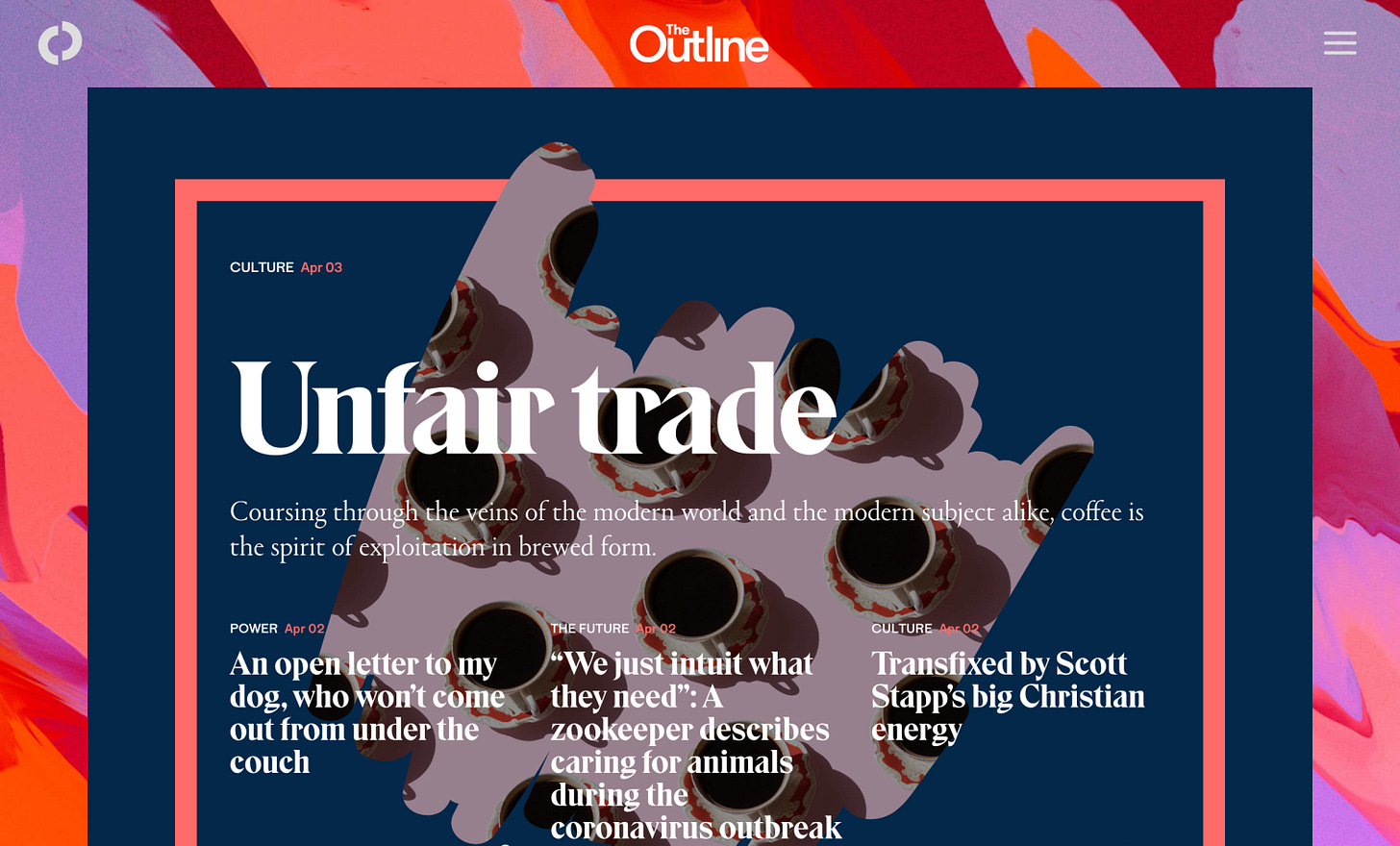RIP The Outline

There are a few stories I want to tell about The Outline, a place I never officially worked at but which I've had some connection to for a longer period of time than any other place I have worked. I'll start with the one about the site itself, the people who ran it, and what they did for people like me.
When I first started writing for The Outline, I was skeptical about how long it'd last, mainly due to two things: Its only ad revenue appeared to come from a company that sold bottles of scotch for $80, and it paid extremely well, even to no-name freelancers based in North Carolina.
Then it just kept going, and going, and going. It kept going even though the editorial staff never seemed to be larger than 10 or 12 people, that the people who owned it had the ambition of Nick Denton and the attention span of gerbils, that it started as a company backed by venture capitalists and that scotch company and quickly became a website that regularly published sharp, funny critiques of capitalism and culture and all of its excesses without the self-assuredness that plagues so much writing on the left. It published the best advice column on the internet and the best non-advice column on the internet. It published Hogs.
In the end, despite all of this, it spanned nearly four years — two presidents! — and likely would have gone for longer if we didn't run into a global pandemic that's promising to extend journalism's Perpetual Recession for another couple of years.
It's a real testament to Leah Finnegan and the final staff of The Outline, which was together for what seems like a very long time, that they kept it going for so long, with such a small staff and so few resources at their disposal. They published hundreds if not thousands of freelance writers and paid them well. They published thoughtful features, unique and interesting essays and interviews, and funny blogs until the very end. And if their experience was anything like ours at the site which came before this one, the End feels like a prolonged battle with a terminal illness before you slip and fall and break your head on a patch of ice, aka get a Google calendar invite to a 10 a.m. meeting with your boss's boss which has no stated purpose whatsoever.
I'll try to keep the sappy personal part quick.
In January 2017, I got fired from my alt-weekly job. I was at that job for ten months, during which I had to learn the basics of journalism along with covering a city and a state I had only recently moved to. I poured my heart and soul into it, worked 80 and 90 hours a week most of the time for my $950 paycheck every two weeks, and quickly burned out. That's not a great recipe for a healthy relationship with your bosses, and before I had the chance to quit, they made the decision for me.
I started freelancing purely out of necessity after I lost my job, because I needed to pay rent, but I was applying for jobs as a copywriter, and in various departments at the slew of colleges in my area — basically, whatever I could do that was stable and would pay me more than $30,000 a year.
When I heard The Outline was taking pitches, I pitched them a story I had been working on for months, about two brothers who were killed by Raleigh police officers in separate incidents three years apart, and the impacts it had on the family they left behind. Later, I wrote a story for The Outline about my best friend's heroin overdose and the overdose of so many other kids I grew up with in Delaware. And another about the senseless death of young people in the city I'm from due to gun violence. And another about hog farming and class politics in North Carolina. I poured so much of myself into stories for the website and my editors throughout my time working with them — Leah, Drew, Brandy, Jeremy, Adrianne, Emilie, and so on — never failed to match my enthusiasm.
Before long, I became a contributing writer there. Then I got a job at Splinter. When Splinter was shut down, I couldn't grieve with my friends in New York and Minnesota and Texas, so Drew got me drunk at Slim's in Raleigh on The Outline's dime and then assigned me a feature that was enough to pay my rent for three months. Somehow, I'm still a journalist. I don't know how much longer it's going to last, but at least I know I want to do it until I no longer have the willpower to cold pitch another editor I interacted with once on Twitter. I owe so much of this to The Outline.
This year, the coronavirus is going to join forces with longstanding, structural problems in the journalism business to wreck so many of the best websites and papers we read. Alt-weeklies, already dying, are going to be on life support by the end of this. Even the websites and papers that survive are going to be hit hard.
The Outline should be remembered as more than just an early casualty of the reckoning we're about to face. I'm going to miss The Outline for selfish reasons; it gave my friends money, and it gave me money, and it gave writers I'd never heard of and now regularly read money, and now there's one fewer website in the world that's willing to give us money.
But I'm also going to miss it because, as Darren Rovell would say, the content was tremendous. The Outline was more than a survivor; it was a good website.


